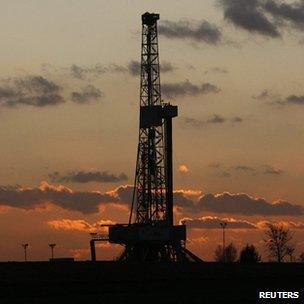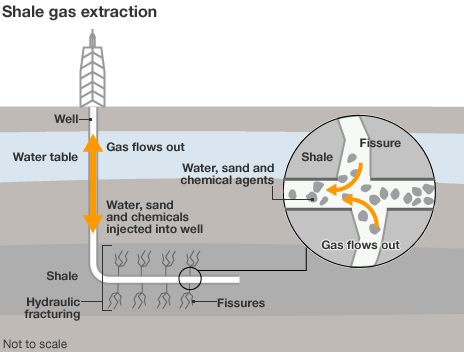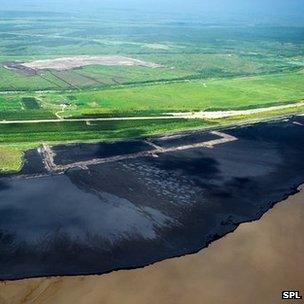Is shale gas the GM of energy?
- Published
- comments

Protests are gathering pace in the US as concern mounts on water pollution
In the early 1990s, British people woke up to the fact that their food supply was about to undergo a technological revolution. Genetically modified crops had arrived.
We didn't ask for them, we didn't know much about them. Fuelled by tales of superweeds, Franken-foods and mice made sick by eating GM potatoes, we came to not like them very much.
With similar sentiments echoed in most parts of Europe, the region has remained pretty much a GM-free zone, as have many other countries around the world. This endures - despite the fact that there have been no documented cases of people made sick from GM foods, Franken or not.
Fast-forward 20 years, and we may be seeing something similar unfold in the arena of shale gas. Local impacts, in the UK at least, haven't been serious and don't look like being serious.
The two professional geologists on the government-appointed expert panel whose report has just been released agree that the chances of fracking producing an earthquake exceeding magnitude three are slim, as a consequence of the basic geology.
Literally thousands of similar-sized quakes were produced through coal mining, and indeed they continue as the industry's legacy. None has made a building collapse or a road buckle, the geologists said - a bit of plaster falling off a wall, perhaps, but nothing more.
They also report a minimal risk of people finding gas in their drinking water. The gas is too deep, they report, and if it had easy passage to the surface, it would have come up already.
So - you might ask - why the fuss?

Arguments about GM crops were often more about the rise of industrial agriculture
Back in 2004 I covered a conference on GM food in Germany, external, and one of my abiding impressions was the sense of mea culpa from scientists I talked to. Many acknowledged the industry had got its tactics badly wrong in the beginning.
They'd not been open about the technology. They'd kept things under wraps for commercial reasons. They'd explored radical genetic ingredients (scorpion genes in tomatoes, anyone?) with no apparent regard for public reaction. And they were developing terminator technologies - the genetic modification of plants to make them produce sterile seeds - that could have been a lethal weapon to traditional farmers in developing countries.

Supporters maintain shale gas production is a tranquil, benign process
Companies also presented a blase face on the ecological consequences of growing GM crops, allowing campaigners to narrate a tale of giant menacing alien plants devouring every beetle and blackbird in sight.
The industry has never recovered from this abortive start, in Europe and many other places; and perhaps it never will.
Shale gas appears to have got off to a similar start.
The industry knows exploration may generate small earthquakes - perhaps we shouldn't even call them earthquakes, but tremors - thanks to decades of experience in the US, external.
Is it open about this up front? Does it actively put this information into the public arena before exploration begins? Does it welcome people onto its sites and brief them on what's likely to happen, and acknowledge the potential for seismic events, while plugging the "cheap energy" line?
Generally, it does not. Which - as with GM, as with the nuclear industry - leaves a huge information void that campaign groups eagerly fill.
Cuadrilla Resources, external, the company leading the UK's shale gas charge, retains the data it's gathered that indicates how much gas is there; and despite the expert panel's recommendation, it may turn out that all ventures are allowed to keep data on the resources and on seismicity under their control.
As experience shows, this does not promote trust.

Biotech agriculture certainly has its issues, but they're more subtle than the Franken-headlines indicate.
In some locations, with some crops, there are real ecological concerns - but not with all crops in all locations.
The same might turn out to be true with shale gas.
All shale formations are different, and companies will employ a variety of regimes when they frack. The US experience indicates a lot of variability, and some learning through experience.
Presumably European practitioners would learn by doing as well.
But in the biotech agriculture field, campaigners have argued there should be no planting until crops are proven to be "safe" while at the same time wrecking trials that could demonstrate safety, thereby ensuring no take-off.

Canada's tar sands emphasise growing reliance on "unconventional" fossil fuels
Shale gas protests around Europe are beginning to see the same kind of dual messaging.
Possibly the biggest real issue around GM crops was that their widespread adoption would set in place agricultural practices that are industrial in nature, based on biodiversity-compromising monocultures, with ownership concentrated in the hands of a few multinational giants.
And the one argument from which shale gas cannot run away is also the one with global, not local, implications.
Quite simply, if Europe invests in shale gas in a big way, it will be almost impossible for the bloc to meet its medium-term climate targets.
The numbers only stack up if shale gas burning is associated with carbon capture and storage.
And with the carbon price bumping along at pretty much an all-time low, external, that's not going to happen any time soon.
The US and Canada left the Kyoto Protocol partly because investment was flowing into "unconventional" fossil fuel development rather than low-carbon technologies - and once the investment is there, economics dictate that the high-carbon energy has to be used.
No energy source is free of risks, as families of the 7,000-odd Chinese who die every year in coal mines would attest.
No system of food production is without environmental impact either.
You might argue that a more mature debate that takes account of all the arguments and all the nuances would result in better policy - for example, if governments are serious about climate change, allowing shale gas use only when CO2 produced by burning it is captured and stored.
But GM crops failed in the court of public opinion, which tends to be less nuanced than science-based policymaking.
And with opinion polls in many countries showing much more support for renewables than for fossil fuels, external, politicians pushing shale gas appear to be at odds with their citizens.
Could shale gas in Europe fall at the spectre of minor earthquakes, just as GM crops fell to the vision of health impacts that didn't materialise?
And if it does, would that in the end be a good or a bad thing?